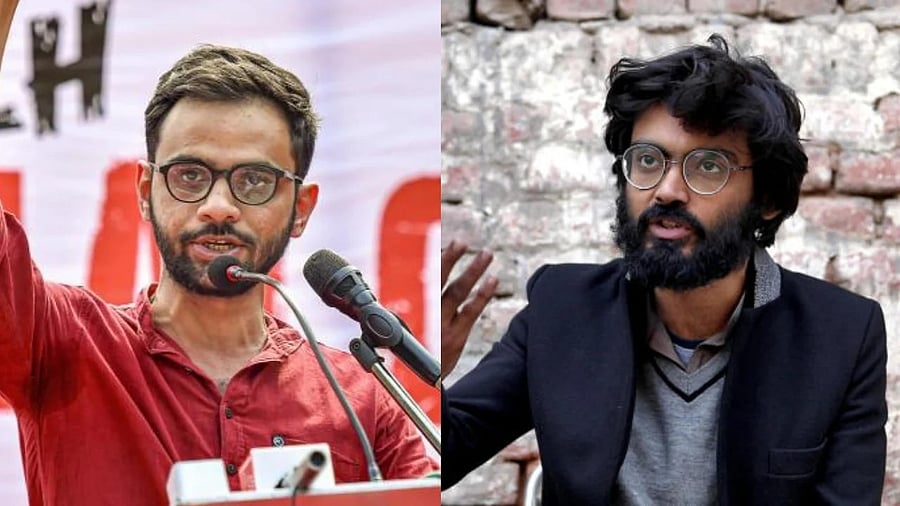
Umar Khalid (L) and Sharjeel Imam.
Credit: PTI Photo, Reuters Photo
New Delhi: The Delhi Police on Thursday vehemently opposed before the Supreme Court the bail plea by former JNU students Umar Khalid, Sharjeel Imam, and others, arrested under the Unlawful Activities (Prevention) Act (UAPA) in the 2020 Delhi riots case, saying they indulged in acts intended to ensure regime change and chose the strategic time during US President Donald Trump's visit.
The police claimed anti-Citizenship Amendment Act protest was used as a camouflage to cause large-scale killings across the country.
A day before the matter is to come up for hearing, the police contended that the conspiracy to incite violence and riots demonstrated that the accused didn’t intend to vent personal grievance or political dissent but to incite violence, which has direct implications on the nation’s economic and social fabric, leading to serious ramifications against the broader society.
“The messaging, tone, and references therein were not incidental but deliberate, reflecting an overarching aim to destabilise the country by setting up a global narrative of ethnic cleansing or pogrom of the Muslim community under the proposed Citizenship Amendment Act (CAA),” the affidavit claimed.
The police contended that the riots were not spontaneous but part of a deep-rooted, premeditated and pre-planned conspiracy.
They claimed that the conspiracy hatched, nurtured and executed by the petitioner was to strike at the very heart of the sovereignty and integrity of the country by destroying the communal harmony and instigating the crowd not only to abrogate public order but also to instigate them to the extent of armed rebellion.
It pointed out the international theory developed in the past few years has termed these kinds of organised/sponsored protests as “regime change operation(s)”.
The police, however, maintained its assertion does not in any manner supplement or substitute the requirement of law as contained in Section 43D (5) UAP Act, 1967, for deciding the bail applications or appeals arising therefrom, which requires the allegations to be examined from the report made under Section 173 of the Code, i.e., the chargesheet.
The police said the materials on record, including the chats established beyond doubt that the instant conspiracy was pre-planned to be executed at the time when the US president was to make an official visit to India.
The protests were calibrated to coincide with Trump’s visit in February 2020 to ensure global visibility.
“This was done to draw the attention of ‘international media’...The issue of CAA was carefully chosen to serve as a radicalising catalyst camouflaged in the name of peaceful protest,” the affidavit claimed.
It contended that there is ocular and irrefutable documentary as well as technical evidence against the petitioners showing their intrinsic, deep-rooted and fervent complicity in engineering nationwide riots on communal lines. “Evidence on record suggests that the instant conspiracy was sought to be replicated and executed PAN India,” it claimed.
The police asserted that violence occurred around the same time in parts of Uttar Pradesh, Assam, West Bengal, Karnataka, Kerala, Maharashtra, and Bihar, describing it as evidence of a “pan-India plan” rather than isolated incidents.
“In the offences which strike at the very root of the integrity of India (UAPA offences), jail and not bail is the rule,” the affidavit claimed.
The police also accused the petitioners of deliberately delaying the trial, as the proceedings for the supply of documents alone took 39 hearings across two years, while framing of charges has been held up for nearly 50 hearings.
“The conduct of the petitioners in the present case is riddled with brazen and blatant abuse of the process of law. The petitioners, through their malafide machinations, have made every attempt available to them in the book to delay, derail and obfuscate the investigation and trial in the matter,” the affidavit claimed.
On September 22, 2025, the Supreme Court issued notice to the Delhi police on pleas for bail by Sharjeel, Umar Khalid and others.
Khalid and others have been in jail since 2020 in connection with the riots which had left 53 people dead and over 700 injured.
The High Court on September 2, 2025 dismissed their bail applications.
